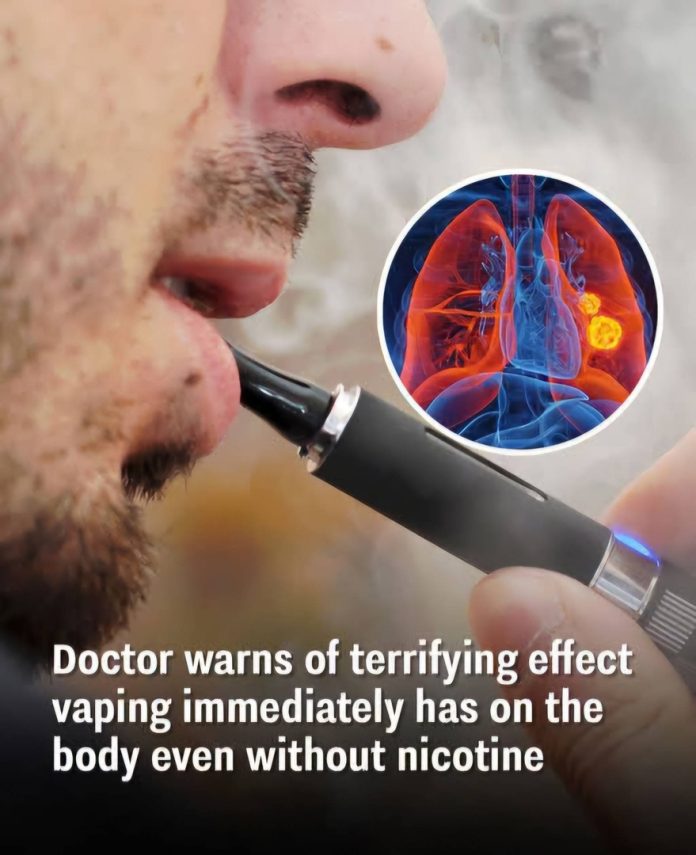Vaping has gained popularity as an alternative to traditional smoking, with many believing that nicotine-free e-cigarettes are a safer choice. However, emerging research and medical experts suggest that even vaping without nicotine can have significant health risks. While many assume that removing nicotine eliminates danger, the chemicals present in vape liquids and the process of inhaling vaporized substances may still lead to serious health concerns.
The Misconception of Nicotine-Free Safety
One of the biggest misconceptions surrounding vaping is that if it doesn’t contain nicotine, it must be harmless. Many people turn to nicotine-free vapes thinking they are a risk-free alternative, but doctors warn that the substances used in e-cigarettes can still cause damage to the body. The process of heating and inhaling flavored vape liquid can release harmful compounds that may affect the lungs, blood vessels, and immune system.

Impact on the Respiratory System
Even without nicotine, the inhalation of aerosolized chemicals from e-cigarettes can cause irritation in the lungs and airways. Over time, this irritation may lead to inflammation, making the lungs more susceptible to infections and long-term conditions. Some individuals who frequently vape have reported experiencing persistent coughing, shortness of breath, and discomfort in their throat, all of which suggest potential respiratory complications.
Additionally, many vape liquids contain substances such as propylene glycol and vegetable glycerin, which, when heated, can produce toxic byproducts. These compounds may not seem harmful initially, but repeated exposure over time can have negative effects on lung function. Experts worry that long-term users of nicotine-free vapes could develop respiratory issues similar to those seen in smokers.
Effects on the Cardiovascular System
Another concern with vaping, even when it lacks nicotine, is its impact on cardiovascular health. Inhalation of heated chemicals has been shown to cause short-term changes in blood circulation, including the narrowing of blood vessels. This can reduce oxygen flow to vital organs and may contribute to increased blood pressure over time.
Some doctors suggest that prolonged use of vape devices could raise the risk of heart-related problems, as any form of vapor inhalation forces the body to process foreign chemicals. While the long-term effects are still being studied, early findings indicate that vaping is not as harmless as many assume, even in its nicotine-free form.
Potential for Cellular Damage
Studies have shown that exposure to the chemicals in e-cigarettes, even without nicotine, can be toxic to cells in the body. In particular, cells in the lungs and throat may become damaged over time due to repeated exposure to aerosolized substances. This cellular damage could lead to a weakened immune response, making it harder for the body to fight off infections and repair itself from everyday wear and tear.
The issue is further compounded by the presence of artificial flavorings in vape liquids. Many of these flavoring agents are not designed to be inhaled into the lungs and may cause unintended side effects when used over an extended period. While they may taste pleasant, their impact on lung tissue is not fully understood, raising concerns among medical professionals.

Why Experts Advise Caution
Despite its growing popularity, vaping remains a relatively new practice, and researchers are still uncovering its long-term effects. Medical experts caution against assuming that just because a vape product is nicotine-free, it is completely safe. Many health risks associated with vaping are linked to the inhalation of foreign substances rather than just nicotine itself.
Doctors recommend that individuals who have never smoked refrain from using vape products altogether. Those who turn to nicotine-free vaping in an attempt to quit smoking should be mindful of potential health risks and consider alternative cessation methods that do not involve inhaling potentially harmful chemicals.
Conclusion
The belief that nicotine-free vaping is a harmless habit is being challenged by growing evidence of its health risks. While it may seem like a better alternative to traditional cigarettes, the reality is that vaping—whether or not it contains nicotine—can still pose dangers to lung health, blood circulation, and overall well-being. Health experts urge caution and encourage individuals to be aware of the risks before assuming that nicotine-free vaping is completely safe.

















